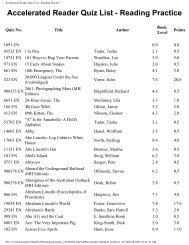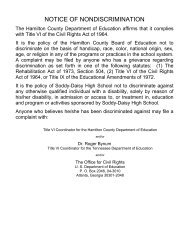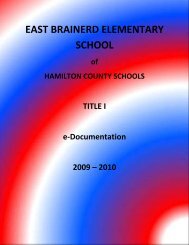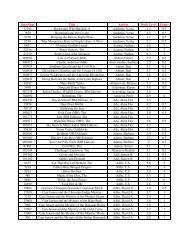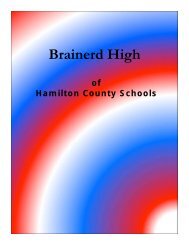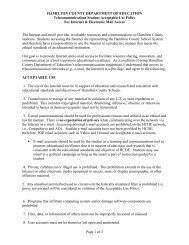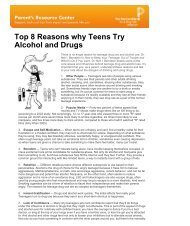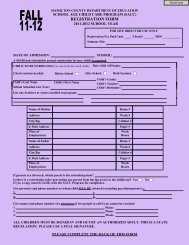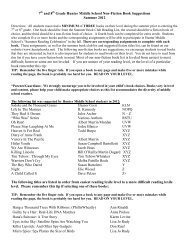RESOURCE PACKET Assessment of Language Impairment
RESOURCE PACKET Assessment of Language Impairment
RESOURCE PACKET Assessment of Language Impairment
Create successful ePaper yourself
Turn your PDF publications into a flip-book with our unique Google optimized e-Paper software.
Early Identification <strong>of</strong> <strong>Language</strong>-Based Reading Disabilities<br />
Name_____________________ Birth Date_______ Grade________ Completed by__________________________<br />
This checklist is designed to identify children who are at risk for language-based reading disabilities. It is intended for use with children at<br />
the end <strong>of</strong> kindergarten or beginning <strong>of</strong> first grade. Each <strong>of</strong> the descriptors listed below should be carefully considered and those that<br />
characterize the child’s behavior/history should be checked. A child receiving a large number <strong>of</strong> checks should be referred for a more indepth<br />
evaluation.<br />
Speech Sound Awareness<br />
Doesn’t understand and enjoy rhymes<br />
Doesn’t easily recognize that words may begin with the same sound<br />
Has difficulty counting the syllables in spoken words<br />
Has problem clapping hands or tapping feet in rhythm with songs and/or rhymes<br />
Demonstrates problems learning sound-letter correspondences<br />
Word Retrieval<br />
Has difficulty retrieving a specific word (e.g., calls a sheep a “goat” or says “you know a woolly animal.”)<br />
Shows poor memory for classmates’ names<br />
Speech is hesitant, filled with pauses or vocalizations (e.g., “um,” “you know”)<br />
Frequently uses words lacking specificity (e.g., “stuff,” “thing,” “what you call it”)<br />
Has a problem remembering/retrieving verbal sequences (e.g., days <strong>of</strong> the week, alphabet)<br />
Verbal Memory<br />
Has difficulty remembering instructions or directions<br />
Shows problems learning names <strong>of</strong> people or places<br />
Has difficulty remembering the words to songs or poems<br />
Has problems learning a second language<br />
Speech Production/Perception<br />
Has problems saying common words with difficult sound patterns (e.g., animal, cinnamon, specific)<br />
Mishears and subsequently mispronounces words or names<br />
Confuses a similar sounding word with another word (e.g., saying “The Entire State Building is in New York”)<br />
Combines sound patterns <strong>of</strong> similar words (e.g., saying “escavator” for escalator)<br />
Shows frequent slips <strong>of</strong> the tongue (e.g., saying “brue blush” for blue brush.)<br />
Has difficulty with tongue twisters (e.g., she sells seashells)<br />
Comprehension<br />
Only responds to part <strong>of</strong> a multiple element request or instruction<br />
Requests multiple repetitions <strong>of</strong> instructions/directions with little improvement in comprehension<br />
Relies too much on context to understand what is said<br />
Has difficulty understanding questions<br />
Fails to understand age-appropriate stories<br />
Has difficulty making inferences, predicting outcomes, drawing conclusions<br />
Lacks understanding <strong>of</strong> spatial terms such as left-right, front-back<br />
Expressive <strong>Language</strong><br />
Talks in short sentences<br />
Makes errors in grammar (e.g., “he goed to the store” or “me want that”)<br />
Lacks variety in vocabulary (e.g., uses “good” to mean happy, kind, polite)<br />
Has difficulty giving directions or explanations (e.g., may show multiple revisions or dead ends)<br />
Relates stories or events in a disorganized or incomplete manner<br />
May have much to say, but provides little specific detail<br />
Has difficulty with the rules <strong>of</strong> conversation, such as turn taking, staying on topic, indicating when s/he does<br />
not understand<br />
Other Important Factors<br />
Has a prior history <strong>of</strong> problems in language comprehension and/or production<br />
Has a family history <strong>of</strong> spoken or written language problems<br />
Has limited exposure to literacy in the home<br />
Lacks interest in books and shared reading activities<br />
Does not engage readily in pretend play<br />
Comments: ______________________________________________________________________________________<br />
_________________________________________________________________________________________________<br />
_________________________________________________________________________________________________<br />
_________________________________________________________________________________________________<br />
Catts, H.W. (1997) The early identification <strong>of</strong> language-based reading disabilities. <strong>Language</strong> Speech and Hearing Services in the<br />
Schools, 28, 86-87<br />
ED –4072 / Rev. 07.09<br />
Department <strong>of</strong> Education<br />
<strong>Language</strong> <strong>Impairment</strong> Resource Packet



